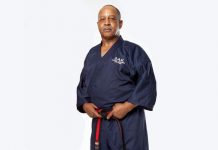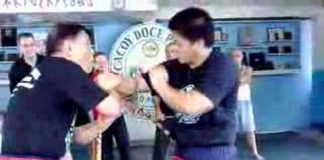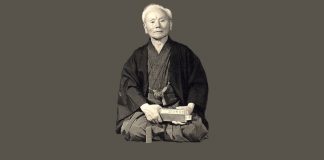The history of San Soo contains all the facts of how Jimmy H. Woo was raised on the art of Tsoi Li Ho Fut Hung from a child. It explains the lineage and how San Soo came to America, but while it has all the facts, it does not contain the essence of who Lo Si Fu or Jimmy Haw Woo was, and is, to many people. In many ways, the man we knew is very different from the young man that grew up in China. As a youth, he was known to start and end the trouble, but with age came wisdom. That wisdom is evident in the man we came to know and admire. In order to explain who he was, we must look at what he said and what he held dear.
“Best Defense is run if I can. I don’t want to kill unless I have no choice…Life is more important than anything on this planet.”
This statement made by Jimmy H. Woo shows the heart of the man. He could defend himself in almost any situation, and as a youth and young man did, but with experience chose to run instead of fight. Is this because he was a coward? No, he respected human life above all else! Jimmy H. Woo knew what he was capable of doing and did not have to prove himself a man. This statement also shows the humility of the man and his willingness to learn from his impetuous youth. As a young man he looked for trouble and was known for being a troublemaker, but again, with age came wisdom. He was not afraid to look like a coward to preserve a life. In his memorial video, Jimmy H. Woo explained, “You are a stronger, better fighter, you don’t have to fight anyone to prove it.”
What makes a man, who is able to kill with his bare hands, so humble and philosophical? In China there is a saying, “humility gains and pride loses.” Maybe Jimmy H. Woo’s humility was a part of his culture, or was it learned along with his daily martial arts lessons? Jimmy H. Woo told a story from his childhood: When he was very young and learning the art, his uncle, Chin Siu Hung, would go around and pick fights for him. The opponent was often much bigger and possibly stronger than himself. Little Chin Siu Dek had to fight these opponents as part of his training. He did not say, but could he have possibly won every fight? It seems humility could have been found in these battles. Along with these hard fought lessons, he also learned the wisdom of not fighting. He realized that there maybe someone bigger and stronger than you around the next corner. A wise man chooses his fight.
Part of the humbleness of the man is found in this statement made to his students, “You think you learn from me, I learn from you too, you believe it.” Do we ever achieve ultimate knowledge? Do we ever become all knowing? Jimmy H. Woo realized that life was an unending classroom with lessons learned everyday from various sources. He respected the students as well as his contemporaries. One student he learned from was Pastor Raul Ries. As a born again Christian, Raul shared with Jimmy H. Woo about Jesus Christ and he recognized the transformation in Raul’s life after he had accepted the Lord. Three weeks prior to his death, he received Jesus Christ as his Lord and Savior. We can all take a lesson from this wise man. Do we miss valuable lessons because they come from an unlikely source?
“If I could speak English more better, you learn more San Soo.” This is a statement Jimmy H. Woo’s students heard often. At times they would laugh when he said it because it was said so often. He was a storehouse of knowledge waiting for someone to unlock the door. If you had the patience to listen to what the man was saying, you gathered pearls of wisdom as he spoke; but if you dismissed him because of his accent, you lost a treasure. He did not set himself up as a great orator full of great wisdom, but a humble man willing to share the secrets of experience. Those that were wise recognized the wisdom of this humble man.
Perhaps the secret to Jimmy H. Woo’s humility and wisdom is found in the words most often associated with him, “You can take my life, but not my confidence.” It was a confidence in knowing who he was and what he was capable of, that made him so humble. He never felt the need to prove himself. He had lived a life that is so far from what we can imagine. He was a teacher, a defender, and a fierce opponent, but in the end, a gentle giant. He could break your neck with his bare hands and at times was forced to do just that, but he would have rather avoided the confrontation.
He was raised in a land of constant conflict. The very existence of the martial arts comes out of the warring factions in China’s history. Each family learned the art and perfected their individual styles to defend their families and provinces. To truly understand Jimmy H. Woo, we must understand the essence of the ancient land he was born and raised in. In our own land of opportunity, can we comprehend a place of constant conflict and hardships? This is the place that shaped the life of Jimmy H. Woo, and ultimately shaped the lives of the hundreds of students he taught both in China and in America. Jimmy H. Woo leaves behind a legacy of family and art, to both those of his blood and those he taught.
“All these years I have been a Si Fu, but now my grandson is here and my cup has changed. I am now Grand Magic, you understand?” And to those that knew him, they did understand that he was “Grand Magic”.
Jimmy H. Woo died in Southern California on February 14, 1991.





